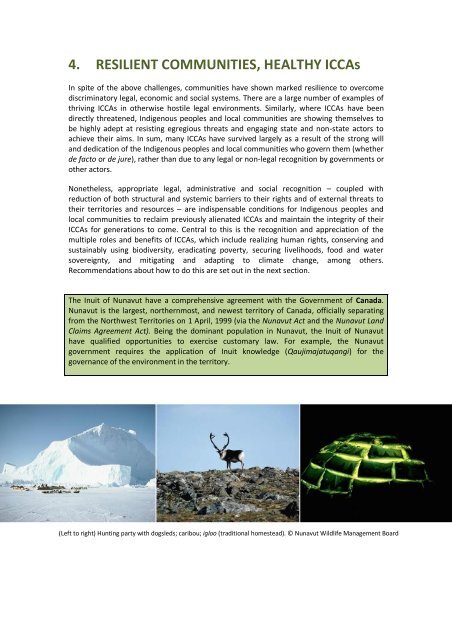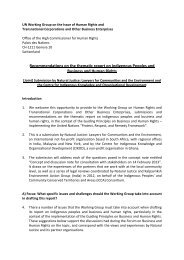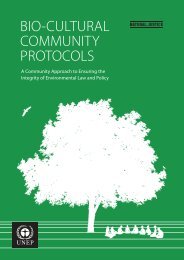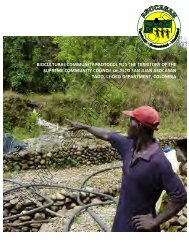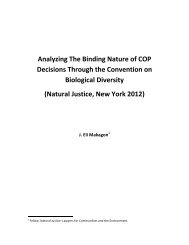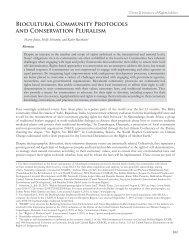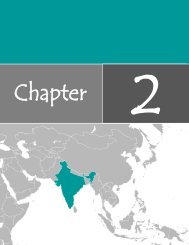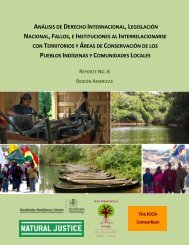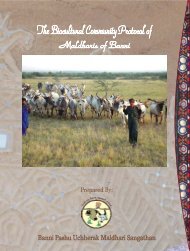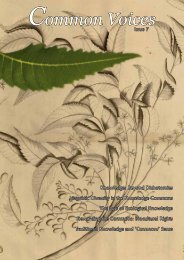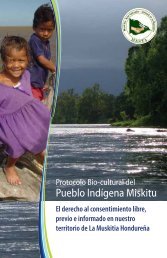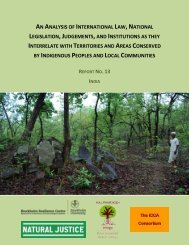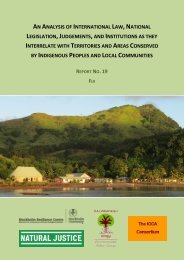In Namibia, support to conservancies has been well-funded in the past, but as indicatedabove, donor support has been declining. One of the problems is that new conservancies arestill emerging and require support from NGOs and government to become operational.Meanwhile, the more mature conservancies are becoming more self-reliant. Conservanciesand community forests are technically able to raise their own funds from national andinternational sources, but this remains difficult because of their remoteness from the capital(Windhoek). Improved communications technology such as cellular telephones andincreasing internet connection in remote areas could change this situation.c. Documentation, Research and Database Support is InadequateMost countries have severely inadequate documentation of and research on ICCAs andalmost none have databases. This weakness is not only prevalent in government agencies,but also civil society; part of the reason is that until very recently, ICCAs have simply beeninvisible to the formal sector of scientists and conservationists. Another problem is that inmany places where such activity is increasing, the documentation, research or databasedevelopment is not by or with the Indigenous peoples and local communities themselves,does not include procedures like FPIC, and is conducted and presented in languages orformats not accessible to the peoples and communities. Finally, documentation cansometimes also lead to unwelcome attention or pressures on an ICCA, for example, byinstigating unsustainable tourism.d. Social Recognition and Support are Far From AdequateWhile public exposure to and understanding of ICCAs is rapidly rising in some countries, inmost it remains a somewhat unrecognized phenomenon. The media, for instance, stillfocuses much more on formal government-managed protected areas. Forums and platformswhere Indigenous peoples and local communities can tell their stories, through which socialrecognition could increase, are extremely limited.e. Networking and Advocacy Support Remain LimitedIn many countries, Indigenous peoples and local communities are struggling to set up theirown networks and advocacy platforms. Where such networks of civil society organizationsdo exist, they are often excluded or only marginally included from important socialprocesses. In multi-lingual or multi-cultural societies, for example, such marginalizationtakes the form of linguistic or ethnic exclusion.Although Chile has well-informed Indigenous peoples’ organizations and an aware civilsociety, lack of coordination between them and especially the lack of representativecommunity voices have hindered an integration of their views in the development of publicpolicies affecting them. An example is the minimal representation that they have had in arecent discussion of the merits of the Biodiversity and Protected Area Service (BPAS). Ananalysis of the impacts of the BPAS on ICCAs and proposals for proper ICCA recognition andsupport are virtually non-existent.
4. RESILIENT COMMUNITIES, HEALTHY ICCAsIn spite of the above challenges, communities have shown marked resilience to overcomediscriminatory legal, economic and social systems. There are a large number of examples ofthriving ICCAs in otherwise hostile legal environments. Similarly, where ICCAs have beendirectly threatened, Indigenous peoples and local communities are showing themselves tobe highly adept at resisting egregious threats and engaging state and non-state actors toachieve their aims. In sum, many ICCAs have survived largely as a result of the strong willand dedication of the Indigenous peoples and local communities who govern them (whetherde facto or de jure), rather than due to any legal or non-legal recognition by governments orother actors.Nonetheless, appropriate legal, administrative and social recognition – coupled withreduction of both structural and systemic barriers to their rights and of external threats totheir territories and resources – are indispensable conditions for Indigenous peoples andlocal communities to reclaim previously alienated ICCAs and maintain the integrity of theirICCAs for generations to come. Central to this is the recognition and appreciation of themultiple roles and benefits of ICCAs, which include realizing human rights, conserving andsustainably using biodiversity, eradicating poverty, securing livelihoods, food and watersovereignty, and mitigating and adapting to climate change, among others.Recommendations about how to do this are set out in the next section.The Inuit of Nunavut have a comprehensive agreement with the Government of Canada.Nunavut is the largest, northernmost, and newest territory of Canada, officially separatingfrom the Northwest Territories on 1 April, 1999 (via the Nunavut Act and the Nunavut LandClaims Agreement Act). Being the dominant population in Nunavut, the Inuit of Nunavuthave qualified opportunities to exercise customary law. For example, the Nunavutgovernment requires the application of Inuit knowledge (Qaujimajatuqangi) for thegovernance of the environment in the territory.(Left to right) Hunting party with dogsleds; caribou; igloo (traditional homestead). © Nunavut Wildlife Management Board


